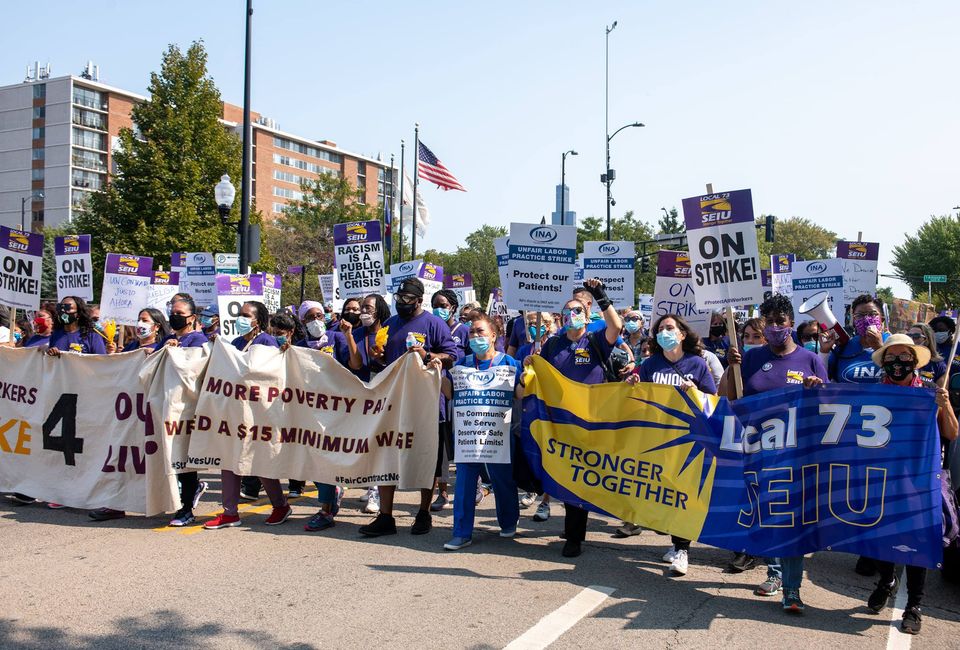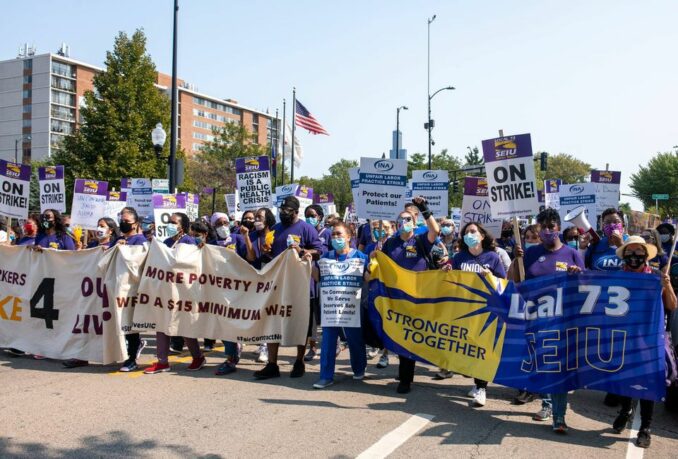

#Strike for our Lives demonstration in Chicago on Sept. 18 by nurses and other hospital workers.
Solidarity was on display when striking nurses and service workers rallied together outside the Thompson Center in Chicago on Sept. 18 to demand Gov. J.B. Pritzker support them in contract talks with the University of Illinois-Chicago and UI Hospital, Health and Sciences System. Labor union and community supporters turned out in unity with the strikers at the over 1,000-strong demonstration.


#Strike for our Lives demonstration in Chicago on Sept. 18 by nurses and other hospital workers.
A confluence of factors pushed these workers to strike: Antilabor edicts by the Trump administration, anti-union rulings by the Supreme Court, COVID-19, management’s intransigence during negotiations in denying higher wages, safety measures and insufficient staff in the midst of a viral pandemic.
Considered “essential workers,” the strikers are on the front lines dealing with COVID-19. Many are working without proper protective equipment, risking their own and family members’ health and lives. High on their list of demands is that management prioritize the protection of all employees from this contagious disease. As of Sept. 16, 270 UIC workers have been infected, and four have died due to lack of PPE.
Over 800 nurses, represented by the Illinois Nurses Association, struck for seven days beginning Sept. 12, demanding adequate staff and PPE. Antilabor UIC officials got a court injunction to prevent 500 other nurses from striking, and they brought in strikebreakers. Negotiations continue.
Then, over 4,000 members of Service Employees Local 73 — technical, clerical, maintenance, engineering and professional employees — struck on Sept. 14. They work at the Chicago hospital and clinics and medical schools in Peoria, Rockford and Urbana, Ill. Black and Latinx strikers are leading the way at UIC.
After being without a contract for 15 months, 94% of the UIC unionized workforce voted to strike. Bosses ignored their calls for safe working conditions, provision of PPE and disinfectants, more staff, a $15 hourly minimum wage and yearly cost-of-living increases. SEIU Local 73 filed charges of unfair labor practices against UIC during contract talks. When management would not move, workers launched an “unfair labor practice” strike.
Physical Therapy Specialist Alicia Uwumarogie at UI Health explained, “We continue to face disrespect at the bargaining table. That’s reflected in UIC being unable to promise masks and other safety equipment and conditions that we’ve long needed. Some of our brothers and sisters have died on the front line. They have given their lives for their jobs. And for what? So UIC can ignore our calls for justice?” (seiu73.org, Sept. 3)
Lavitta Stewart, Program Service Aide at UI Health, emphasized, “We are done with their lack of empathy and lack of respect. Workers shouldn’t be making $10-$12 an hour. Workers shouldn’t be worried about contracting a virus that UIC has let run rampant amongst the workplace.”
The SEIU Local 73 Bargaining Committee Sept. 14 statement stresses that UIC has the funds to pay agency employees and strikebreakers and to erect a new building, but not to pay their employees salaries they deserve!
Strikers are determined to stay on the picket lines for as long as they must to get a decent contract, which recognizes and provides for their economic, health and safety needs — and treats them with respect.
Boston Baristas at Blue Bottle coffee shops in Boston are so fed up with their…
En su continua campaña genocida contra el pueblo palestino, Israel utilizó aviones no tripulados el…
Israeli military veteran in Warsaw: ‘Liberate all ghettos’ By Michael Kramer On the 82nd anniversary…
The Vietnamese revolution to liberate its country from imperialism had a decisive victory 50 years…
The epic struggle of the Palestinian people against the full weight of U.S. imperialism and…
The following report comes from the Bronx Anti-War Coalition organizers on a protest held in…